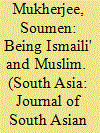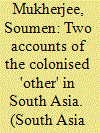| Srl | Item |
| 1 |
ID:
105904


|
|
|
|
|
| Publication |
2011.
|
| Summary/Abstract |
This paper examines the role of politico-religious leaders of smaller sectarian and sub-sectarian Muslim sects in the broader politics of Muslim community consciousness in colonial South Asia. The case of Aga Khan III, the Imam of the Shiite sub-sect of the Khojas, provides our example. This complex process, whereby the Khoja sub-sect increasingly came to identify with the broader Muslim community in colonial South Asia-albeit preserving certain sub-sectarian particularities-is examined with reference to the paradigmatic model of 'path dependence'. The balance that Aga Khan III struck between the socio-religious and political worlds-hinging upon his dual role as a spiritual and a political leader-is deconstructed with the qualified employment of the analytical tool of 'strategic syncretism'. The paper shows how specific socio-religious sub-sectarian traits were effectively retained at the same time as an overarching political consensus forged links between different Muslim sectarian traditions.
|
|
|
|
|
|
|
|
|
|
|
|
|
|
|
|
| 2 |
ID:
097727


|
|
|
|
|
| Publication |
2010.
|
| Summary/Abstract |
Taking examples from South Asia, this article shows how British colonial knowledge about the non-European 'other' hinged substantially on the participation of sections of that other, especially in the context of liminal groups, for whom no ready standardised formula of identification was available. Development of a colonial episteme often involved active intervention from the colonised body, thereby dispelling any strict notion of coloniser-colonised alterity and mere top-down governance. This process of identity construction took place in several arenas and also involved negotiations in courts of law, where rival sections of the amorphous colonised body fought for competing ideals of selfhood. Complementing this legal construction were ethnographic formulations, internally diverse, and often relating to broader politico-intellectual concerns and debates of the Empire, at different planes in different ways. The article explicates their theoretical bases and practical modalities.
|
|
|
|
|
|
|
|
|
|
|
|
|
|
|
|